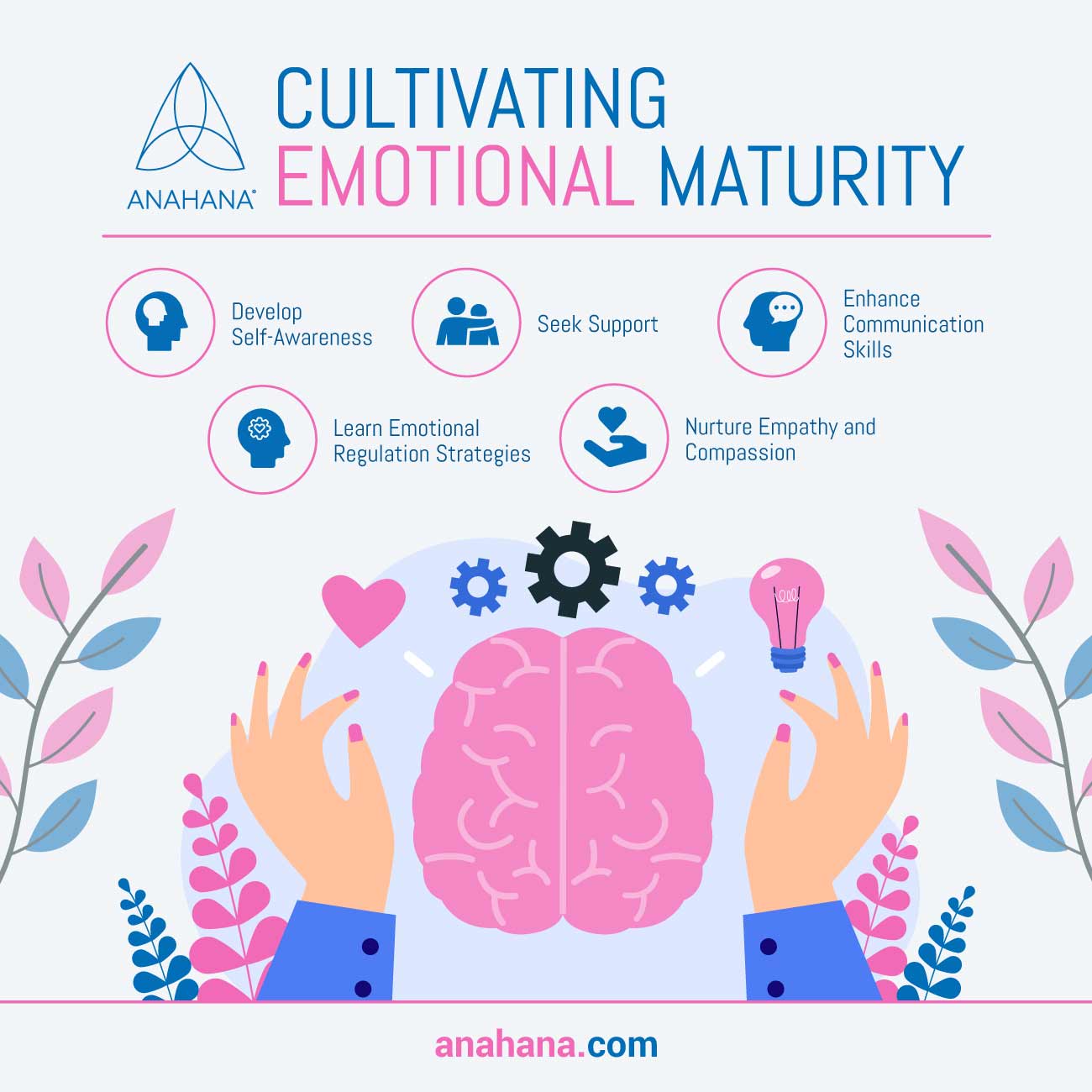
Table of Contents
Emotional maturity is vital for personal growth, resilience, and empathy. It involves understanding and regulating emotions, fostering self-awareness, effective communication, and empathy. Cultivating these traits enables healthier relationships and better decision-making, contributing to overall well-being.
Emotional Maturity Explained
 Emotional maturity represents personal growth and development, empowering individuals to navigate life's complexities with wisdom, resilience, and empathy.
Emotional maturity represents personal growth and development, empowering individuals to navigate life's complexities with wisdom, resilience, and empathy.
This level of maturity extends beyond merely experiencing and expressing emotions; it involves a profound understanding of our emotional landscape and the adeptness to navigate it skillfully.
Being emotionally mature is comparable to possessing an inner compass that guides us through life's intricacies, allowing us to respond thoughtfully and purposefully instead of reacting impulsively and succumbing to our emotions.
It encompasses the capacity to observe, process, and manage emotions healthily and effectively, preventing them from dictating one's thoughts, actions, and relationships.
Although chronological age does not inherently ensure emotional maturity, it can be cultivated through self-reflection, introspection, experience, and a commitment to personal growth in adulthood which ultimately leads to more fulfilling life.
Signs of Emotional Maturity
An emotionally mature individual possesses self-awareness, empathy, emotional regulation, and positive coping strategies.
They maintain healthy boundaries, communicate effectively, accept responsibility, and exhibit a high degree of emotional intelligence.
These characteristics enable them to build strong and meaningful relationships, make sound decisions, and lead a fulfilling and balanced life.
-
Self-awareness: An emotionally mature individual possesses a high level of self-awareness, understanding their own emotions, strengths, weaknesses, and triggers. They can accurately recognize and label their feelings without being overwhelmed by them.
-
Emotional regulation: Emotionally mature individuals have developed effective strategies to manage their emotions. They can control impulsive reactions and respond to challenging situations with composure and empathy.
-
Empathy: One of the hallmarks of emotional maturity is the ability to empathize with others. These individuals can put themselves in someone else's shoes, understand their emotions, and respond with compassion and support.
-
Adaptability: Emotionally mature individuals are flexible and adaptable in various situations. They can handle change and uncertainty with a positive attitude and a willingness to adjust their perspective and actions accordingly.
-
Conflict resolution: They handle conflicts constructively, seeking resolution rather than escalating the situation. Emotionally mature individuals are skilled communicators who actively listen to others and respectfully express their feelings.
-
Empowerment of others: These individuals encourage and empower those around them, supporting the growth and development of others while celebrating their achievements.
-
Capacity for forgiveness: Emotionally mature individuals can forgive others and themselves for past mistakes and transgressions. They recognize that holding onto grudges only hinders personal growth.
-
Self-motivation: They take responsibility for their actions and decisions, staying motivated to pursue their goals despite obstacles.
Signs of emotional immaturity
Recognizing signs of emotional immaturity can be crucial for personal growth and building healthier relationships with others. Encouraging self-awareness and seeking professional support can aid in developing emotional maturity and improving mental health.
Difficulty managing emotions
Emotionally immature individuals may struggle to regulate their emotions, leading to frequent mood swings, outbursts, or overreacting to minor issues.
Lack of empathy
They may show little understanding or concern for other people's emotions, often dismissing or belittling their feelings.
Self-centeredness
Emotionally immature individuals tend to be self-absorbed, prioritizing their needs and desires over others without considering the impact on those around them.
Impulsivity
They may act impulsively without considering the consequences, often leading to regrettable decisions.
Ignoring mental health needs
Emotionally immature individuals may neglect their mental health, avoiding seeking help or addressing their emotional issues.
Why Does Emotional Immaturity Occur
Emotional immaturity can arise from various factors that impact an individual's emotional development and ability to handle emotions effectively. Some of these contributing factors include:
- Neglect, abuse, or inconsistent parenting in childhood
- Growing up in an environment where emotions are disregarded
- Lack of guidance or education on emotions
- Traumatic events in childhood or adult life
- Emotional overprotection
How to Develop Emotional Maturity

Building emotional maturity means putting effort and practice. Here are some practical steps to cultivate emotional resilience and maturity:
-
Develop Self-Awareness: Reflect on your emotions, triggers, and behavior patterns. Journaling, meditation, and seeking therapy or counselling can help deepen your self-awareness and self-improvement.
-
Learn Emotional Regulation Strategies: Explore techniques such as deep breathing, cognitive reappraisal, and mindfulness to regulate your emotions effectively. These strategies can help you manage intense emotions, reduce stress, and maintain emotional balance.
-
Nurture Empathy and Compassion: Practice empathy by actively listening to others, seeking to understand their perspectives and validating their emotions. Practice self-compassion, recognizing that everyone is on their journey.
-
Enhance Communication Skills: Improve your communication by expressing your emotions assertively and respectfully. Learn to actively listen and validate the emotions of others to foster meaningful connections.
-
Seek Support: Don't hesitate to seek emotional support. Surround yourself with a supportive network of friends, family, or professionals who can provide guidance and encouragement.
Frequently asked questions
How to spot emotionally mature people?
Although emotional maturity is an ongoing process of self-discovery and self-awareness, there are many hallmark signs of someone who has developed a considerable amount of emotional maturity.
These individuals are often accepting of themselves and others, are comfortable being alone, can effectively articulate their emotions and needs to others, have healthy emotional reactions, and set healthy boundaries with themselves and others.
How do you become emotionally mature?
Developing emotional maturity is an endless process, so patience is key. Learning empathy towards yourself and others is a good step in this process.
It is also useful to have a growth mindset; working towards personal goals helps you become self-aware of your strengths.
Emotional maturity also includes being aware of your emotions without judgement or reaction; letting yourself feel these are critical and a pillar in the development of emotional maturity.
What is emotional immaturity?
Emotional immaturity is a lack of emotional development or the inability to understand and manage one's own emotions. It usually involves an inability to recognize and regulate emotions in oneself, as well as difficulty in recognizing and responding appropriately to the emotions of others.
Emotionally immature people may have difficulty expressing their feelings, be overly sensitive, or react impulsively or childishly.
References
Connect with your emotions: How to improve emotional maturity
10 Signs and Examples of Emotional Maturity
Emotional Maturity in Relationships
Maturity (psychological) - Wikipedia
When Do You Know You Are Emotionally Mature? 26 Signs of Emotional Maturity
Emotional Maturity: What It Looks Like
Emotional Maturity and General Well-Being of Adolescents
Disclaimer
The contents of this article are provided for informational purposes only and are not intended to substitute for professional medical advice, diagnosis, or treatment. It is always recommended to consult with a qualified healthcare provider before making any health-related changes or if you have any questions or concerns about your health. Anahana is not liable for any errors, omissions, or consequences that may occur from using the information provided.

By: Anahana
The Anahana team of researchers, writers, topic experts, and computer scientists come together worldwide to create educational and practical wellbeing articles, courses, and technology. Experienced professionals in mental and physical health, meditation, yoga, pilates, and many other fields collaborate to make complex topics easy to understand.
